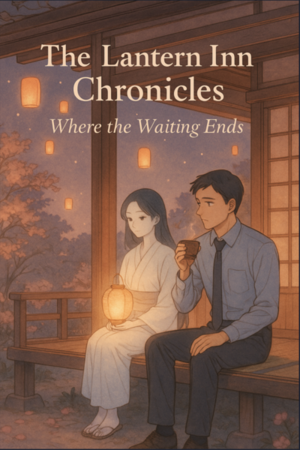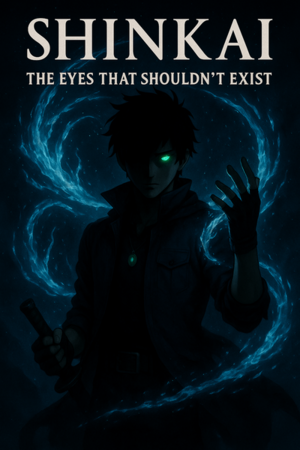Chapter 12:
The Man Who Refused to Remember
Lantern Inn Chronicles
It began with a boy standing at the edge of the inn’s gate, motionless beneath the rustling paper lanterns. He didn’t knock. Didn’t call out.
He just stood there, as if crossing that threshold might confirm something he wasn’t ready to admit.
Kaito noticed him from the hallway window. A tall silhouette, all elbows and hesitation, framed in the misty twilight. The boy had the look of someone who had walked too far without knowing where he was going — like a page torn from a book that never finished printing.
Kaito stepped outside.
“You’re welcome to come in,” he said softly, not wanting to startle him.
The boy didn’t move. Didn’t meet his gaze.
“I’m not staying,” he muttered, voice hoarse, almost brittle. “I don’t deserve to be here.”
Kaito didn’t press. He had learned long ago that people often spoke in circles when their hearts were squarely locked.
“You don’t have to stay,” he replied. “Just come inside. It’s warm. You look cold.”
That seemed to break something. Or at least bend it.
The boy shuffled in without a word, feet dragging across the polished wood floors like he wasn’t sure if he was walking or being pulled.
He didn’t give a name.
Didn’t look at the guest register on the counter.
He took a seat by the window, far from the others — though the inn wasn’t crowded these days. The moonlight fell on his face like a slow revelation: young, maybe seventeen. Slouched shoulders. Skin too pale, as if he’d spent more time under streetlights than sunlight. And eyes — glassy, vacant, like the river after it has swallowed something it wasn’t meant to keep.
He didn’t speak. Didn’t ask for food or a blanket. Just stared at his own reflection in the darkened glass, as if trying to remember whether it still resembled someone worth keeping.
That night, Kaito left a warm bowl of soup near him on the table — miso with seaweed, just enough tofu to feel like care. The boy didn’t even glance at it.
But the next morning, the bowl was empty — wiped clean with surprising precision.
It became a quiet ritual.
Every night: food, no words, silence.
Every morning: the bowl returned, always emptied, always cleaned.
Three nights passed like this. The fourth brought a change.
That night, the boy finally spoke. His voice, when it came, felt like it had to claw its way out of him.
“Do you think everyone gets forgiven here?”
Kaito, standing nearby with a tea tray, paused. Then walked over and sat down across from him.
“This isn’t a place for forgiveness,” he said gently. “It’s a place for honesty.”
The boy gave a bitter half-smile, the kind that didn’t touch his eyes.
“Same thing,” he muttered. “If you say it out loud, it hurts less.”
Kaito tilted his head, considering. “Sometimes it hurts more. But at least it’s real.”
That night, the boy finally gave a name.
“Riku.”
No last name. Just that. Like Reika.
As if surnames were weights tied to the ankles of the drowned.
He didn’t explain why he was there. But Kaito could feel it — the way he carried himself. Riku wasn’t angry at the world.
He was angry at himself.
Fiercely. Constantly.
It was the kind of anger that didn’t shout, didn’t strike, didn’t leave holes in walls or bruises on skin. It sank inward instead, growing like mold in places no one could see. It soured the breath. Curled the hands. It didn’t demand justice or vengeance — it whispered lies late at night: You’re the rot. You’re the mistake. You’re the one who never should’ve been.
It festered.
Not all at once, but gradually, like a fruit left too long on the branch — skin still firm, but the center collapsing, softening, until even a gentle touch could break it open.
Kaito recognized that kind of silence.
Because once, a long time ago, he had worn it like a second skin.
He had learned that some kinds of sorrow didn’t want to be comforted — they just wanted to be seen.
It was nearly midnight when Kaito found Riku.
The inn had gone quiet. Even the lanterns had dimmed, as if they understood the moment required something more delicate than light.
Riku was curled up near the kitchen door, tucked into a corner like he was trying to disappear into the woodwork. His shoulders trembled in irregular bursts. His face was buried in his arms. He didn’t cry out. Didn’t call for help. Didn’t ask to be found.
He just… shook.
When he finally spoke, the words broke on his tongue before they even fully formed.
“I shouldn’t be here,” he whispered, more breath than voice. As if saying it aloud made it more real. More shameful.
Kaito didn’t offer comfort.
He didn’t reach out.
He just sat down beside him, back to the same wall, knees pulled in, as if matching the boy’s shape would make the moment less sharp.
His voice came softly, almost like he was talking to himself.
“You’re not the only one who’s thought that.”
And somewhere — far behind the quiet — a door in memory cracked open.
Flashback:
Sixteen.
Kaito had been sixteen the night he stood in front of his childhood home, soaked from the kind of rain that felt like punishment. His suitcase was old — borrowed from a neighbor — and the umbrella in his hand was useless, folding inward with the wind’s cruelty.
Behind the front door’s frosted glass, his sister’s voice rang out like a slap:
“You just leave, like always!”
But he hadn’t left.
Not that night.
He stood there for hours, staring at the faint yellow glow from the kitchen window. He could hear their mother crying inside, trying to muffle it in the folds of her apron.
But the door never opened.
No one came out.
No one even peeked through the curtains.
So Kaito stayed. The whole night. Until the rain stopped. Until the sparrows stirred in the trees. Until the ache in his legs became part of his heartbeat.
He never knocked.
Because deep down, he’d convinced himself of one thing:
Maybe if I disappear long enough… someone will come looking. Someone will want me back.
No one did.
And that night stayed inside him like a knot that never loosened.
Back in the inn, the scent of miso and old wood grounded the moment.
Riku’s voice cracked in the silence.
“I did something I can’t take back.”
Kaito didn’t ask what it was. He didn’t need to.
Pain was pain. Regret didn’t need a name to be understood.
“You’re still here,” he replied quietly. “That means you still can.”
Still change.
Still remember.
Still try.
Later that evening, Riku wandered into the lantern corridor — the hallway that flickered with patient light, each flame a soul suspended between goodbye and almost.
The boy stood at the threshold, staring down its length as though afraid the lights would judge him.
“There’s a door for me, isn’t there?”
Kaito stepped beside him, voice steady.
“Room Six.”
Riku's jaw tightened. His fingers flexed, as if gripping the memory of something too sharp to carry.
“What happens if I go in?”
“You rest,” Kaito said. “Or you remember. Whichever you need more.”
The boy hesitated. Not out of fear, but conflict. He wasn’t sure what he deserved.
Then, almost too softly to hear, he said:
“I left someone behind.”
His voice cracked on the word left.
Kaito met his eyes.
“Then wait,” he said. “Like Reika did. You don’t have to go just yet.”
Riku stared at him, as if weighing whether those words were a kindness or a trap.
“You talk like someone who was left behind too.”
Kaito smiled faintly.
“I think we all were. Somehow.”
The next morning, light filtered in through the high windows. The scent of warm broth floated out of the kitchen — soft, nourishing.
Kaito paused in the hallway when he heard a gentle clatter.
Inside the kitchen, Riku was chopping tofu.
Badly. Uneven cuts. Some pieces too thick, some crumbling apart.
But he was there.
Present.
Trying.
Reika passed him the kettle. For a second, their hands brushed.
Riku looked at her — then nodded. Just once.
He still didn’t speak much.
But sometimes, silence stopped meaning shame. Sometimes, it just meant… starting again.
The lantern outside Room Six still burned.
It was no longer a signal of pending departure.
It was something steadier.
A quiet agreement between pain and patience.
A soft vow.
That healing doesn’t always mean walking away.
Sometimes, it means sitting down.
Staying.
And believing, even in the smallest corners of your bruised heart, that maybe — just maybe — even forgotten boys with quiet voices and too many apologies still deserve to be welcomed back into the light.




Please sign in to leave a comment.